THE CONCLUSION TO MY ANALYSIS OF MÖELLER & BOTELHO’S 7 – THE MUSICAL, ONE OF THE FINEST MUSICAL-THEATER PIECES EVER TO HIT THE BRAZILIAN STAGE
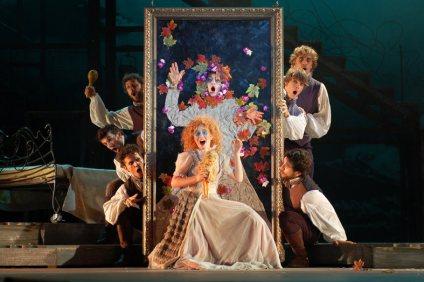 “The Heart in the Forest” with Clara (Marina Ruy Barbosa) (Photo: Paulo Ruy Barbosa)
“The Heart in the Forest” with Clara (Marina Ruy Barbosa) (Photo: Paulo Ruy Barbosa)
In this final chapter of my multi-part study of Charles Möeller, Claudio Botelho, and Ed Motta’s masterwork 7 – The Musical, wherein we left readers with an in-depth analysis and appreciation of Act I (see the following link: http://josmarlopes.wordpress.com/2014/01/05/7-the-winner-the-brazilian-musical-comes-of-age-part-two-ele-vai-voltar-hell-come-back-i-vow/), we conclude with the major occurrences of Act II (Reader Alert: Spoilers ahead!).
Prologue on the Ice: “The Heart in the Forest”
The prelude is taken (quite appropriately, one might add) from the “Seven Curses” ensemble in Act I. After a brief exchange between Madeleine and Elvira atop a balcony, the curtain rises on an ice-covered lake. Just below the surface is the frozen body of a young woman, Bianca, who was last seen wandering the streets in search of safe haven from the storm. The premise is that she must have fallen into the lake by accident (a possible stand-in for Rio’s Lagoa Rodrigo de Freitas).
The seven young men (or dwarfs) assume the roles of motorized musicians, the type once found at amusement parks. In this instance, the dwarfs are providing a musical diversion for the ad hoc skating rink. Each of the men is playing a different instrument (piano, trombone, maracas, accordion, etc.) in robotic fashion. Clara is frolicking behind them, tossing her dolls into the air and giggling uncontrollably like a child.
The scene opens with an impressive number, “The Heart in the Forest,” which recounts some peculiar plot points:
Eis o coração no bosque
Eis mais um príncipe
Mais uma abóbora
Quantas doze badaladas
Quantas sete luas
There’s a wounded heart in the forest
There’s your Prince Charming
A pumpkin, a coachman
A clock will strike at twelve
A calendar that reads of seven
The next stanza is directed at Clara’s rescue from the “castle” that Old Stepmother has allegedly imprisoned her in (another nod to the Rapunzel story):
Eis o caçador
Eis o alazão
Quem invade o teu castelo?
E vem te enfeitiçar com beijos
Rubros
Loucos?
Hunter with a horn
Rider on his horse
Who will then invade my bastion?
And when will he enchant me with feeling,
Ardor,
Passion?
These are but the musings of a prepubescent girl about to reach maturity, who still dreams of a knight in shining armor to sweep her off her feet and carry her away on his mount. A mysterious voice — that of the frozen Bianca, whose head protrudes from a hole in the ice — interrupts the goings-on by emitting a few coloratura scales in melodious counterpoint to Clara and the dwarfs.
“Mop That Dirty Floor”
The scene shifts to Old Stepmother’s house. She’s barely concluded a portion of the Snow White story, when Clara asks a question of her: “Do you love me?” Old Stepmother conveniently sidesteps the issue, but Clara insists that deep down inside, “You love me as if I were your own daughter!” To this the cantankerous old woman snaps back that she is Clara’s stepmother and, as such, demands that she be respected. She sends the girl off to make her bed and takes her leave.
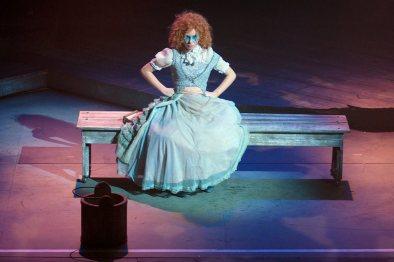
Scrubbing the floor in as resentful a manner as she can manage, Clara expresses her annoyance by repeating the old lady’s instructions in sing-song fashion (“Mop that dirty floor, tra-la-la-la-la…”) to the same melody that Elvira and Madeleine used on Amelia in a comparable situation at the brothel. Overhearing Clara’s mocking tone, stepmother orders her to keep silent. Clara hurriedly exists from the room. Old Stepmother repeats to herself the words she has just hurled at Clara: “You don’t know who I am. You don’t know who you are…”
“A Little Babe Came Knocking”
At that, there is a flashback to twenty years prior, when Dona Rosa, Amelia’s “godmother,” recalls how she came to be in possession of baby Amelia (Note: an extended scene that was cut from the original text included Dona Carmen and Dona Odette as well). “It was a dark and terrible night of rain,” when Rosa heard a knock at the door. A man dropped off a baby girl whose name was Amelia; the man turned out to be her father. We are told that Dona Rosa embraced Amelia as her own child, an abandoned orphan with no past and very little future. Now we know who Amelia is, but who is Clara?
“Oh, Look at Me”
Returning to room number 7, where Amelia has been “entertaining” her client Alvaro, we hear the “Song of the Wishes,” as intoned by the young men, along with Carmen’s admonition to Amelia to bring her “a heart that’s strong, still young and vibrant, happy and free” — only this time it is sung by Alvaro, the young man whose strong heart now beats for Amelia, and that Amelia so desperately needs in order to complete her task.
Repeating the same motion with the knife that tore open the Belt Strangler’s chest in the early going, the enamored Amelia cannot bring herself to kill the fetching lad. Her reasoning: “He loves me, the boy loves me!” The clairvoyant urgently reminds her that she’s not herself, that both she and the boy have been bewitched by the magic spell. Again, we see the past intruding upon the present, as the couple finds itself trapped in a time warp, unable to break free. Amelia and Alvaro make plans to run away together. They will meet at the train station at midnight.
Carmen warns Amelia that if she fails to comply with the seventh task, she will face a terrible curse. Amelia looks at her in disbelief: “What curse?” Carmen obliges with a riposte: “The seven years curse. Whoever fails to complete the spell will live seven years in one.” “How’s that?” Amelia inquires. “You are going to get seven years older with each passing year,” Carmen admonishes. “The circle must be closed.” She holds up a hand mirror to Amelia’s face. But instead of reacting with alarm, Amelia can only gaze at her pale features. She stares blankly into the mirror, transfixed by what she sees (the fairy-tale phrase, “Who in the land is fairest of them all?” comes to mind).
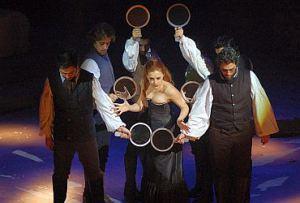
Amelia now begins her song, “Olhe pra mim” (“Oh, Look at Me”), the most insightful and psychologically potent number of all. The young men surround Amelia while they hold hand mirrors up to her face. But what does Amelia see? Speculating on the possibilities, perhaps she can peer inside herself — inside her soul, that is —and outside, at her fading beauty.
In fairy tales, mirrors can represent windows to the soul. Here, Amelia’s soul is reflected back at her as a form of punishment for the evil she has done — and still intends to do. Beauty is only skin deep, so the saying goes, and the face that turns men “on” can also turn them “off,” a cruel lesson for any woman to learn:
Diz que me viu
Como eu era
Meus azuis
Os verdes meus
Meu mar, meu mar
What do you see?
My life as it was then
My true self
My dark side as well
My calm, my calm
In the concluding moments of her song, the words “Que as portas já vão fechar, fechar” – “And the doors will be closing soon, so soon” ring out loud and clear. It’s the darkest of sentiments, a remarkable display of chromaticism at work (note the presence of piano and vibraphone), along with the sophisticated use of melody and harmonics — a marvelously atmospheric piece!
Intermezzo
We segue directly to the most sensuous, indeed the most dreamlike passage in the entire musical: the scene of Clara, slowly and deliberately, descending the steps to Old Stepmother’s house. She is wearing a revealing, low-cut gown that had once belonged to her mother. For the first time the girl is in touch with her own sexuality. We marvel at the radiance of her hair which is straight and combed for the occasion, the contours of her form, the loveliness of her skin and face — in sum, she’s a lovely flower of the night that has come into bloom.
First the violin, then the cello, play a sumptuous solo passage based on the opening section of “There’s a wounded heart in the forest,” but the pace is languorous, the atmosphere sexually charged, the entire episode appearing to take place in Clara’s mind. This sequence is in sharp contrast to the number that opened the act, where Clara, in the last throes of her childhood, is found still playing with her dolls, laughing and carrying on over the frozen lake — the lake that encases Bianca’s frozen body.
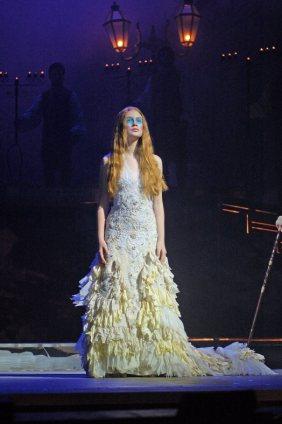
Old Stepmother chastises her for wearing her mother’s gown and tells her that “mommy” was a worthless tramp, that Clara is “ugly, very, very ugly.” Our eyes, however, tell a different story. We see an ugly duckling transformed into a gorgeous swan. Clara sways her arms in time to the music as she glides down the staircase, in delicately choreographed movements that provide ample proof of her swan-like transformation. The audience, too, becomes aware of the moment, i.e., of her entry into womanhood — just as Bianca before her had experienced with the pricking of her finger.
Toying with the girl (probably to get back at her for her prior misbehavior), Old Stepmother observes that “Mirrors are a woman’s worst enemy,” which only leads to Clara repeating the hackneyed phrase, “Magic mirror on the wall / who in the land is fairest of them us?”
After telling her again to keep her mouth shut, Old Stepmother rudely berates her. The poor heart-broken girl bursts into tears and runs off to her room. Right on cue, the seven young men repeat the opening stanza of “There’s a wounded heart in the forest.” We know now whose heart has been wounded, among so many unfortunates: “There’s your Prince Charming, a pumpkin, a coachman / A clock will strike at twelve / a calendar that reads of seven.” It’s the plot of the musical itself, brilliantly encapsulated in verse and song.
“Mommy’s on Her Way”
We are back at Dona Odette’s house of ill repute. Amelia is preparing to leave. Not wanting to lose such a valuable “employee,” Odette invites her to stay in room number 7 for as long as she desires. But Amelia reveals that she is taking the midnight train back to her home.
Odette dismisses the two whores (who realize they must now do all the housework themselves) and contacts Carmen by phone to apprise her of the situation: Amelia is on her way at last. Their plan worked! The two women “go back a long way together” as Carmen once hinted. They have worked out the details of their scheme to perfection and, if we are perceptive enough to notice, have succeeded in sparing themselves the curse’s wrath by luring Amelia to the appointed spot before the clock strikes twelve.
We now see Herculano through a window of the house he shares with Bianca. He hums a lullaby to the child, the melody of which belongs, ironically enough, to Elvira and Madeleine’s number, which was also taken up by Clara. He is interrupted by a phone call telling him that Bianca’s body has been found on the beach. Next, we find Bianca lying on a bier — in juxtaposition to the episode in the Prologue to Act I, where Clara was seen lying on a bench underneath the huge clock while holding a lily in her hands. Bianca, too, is holding a lily, only she is unconscious. The seven young men are there, surrounding and protecting her much as the seven dwarfs would do.
Shifting rapidly to the next scene, Clara and Old Stepmother argue whether Prince Charming had arrived in time to rouse Snow White from her poisoned slumber. Old Stepmother complains that Clara always interrupts her at this point. Clara counters that Old Stepmother hates it when Snow White gets kissed and lives happily ever after. “Your mother died, my dear,” the stepmother proclaims coldly. “There was no prince to wake her. She died while drowning.” The contrast between Snow White and Clara’s mother is purposely done in order to create a play on words as well as inject a little levity.
In another scene change Alvaro enters and is captivated by Bianca’s frozen form. He impulsively kisses her on the lips. This startles the other men as well as the two prostitutes peering over the balcony. Unexpectedly, Bianca sits up with a start — the dead have come back to life again, raising the “specter,” if you will, of whether any of them were dead to begin with, or merely feigning death. This issue of permanence (or the lack thereof) is the insoluble dilemma of the play: is there such a thing as the separation of reality from fantasy?
Another brief scene features Amelia speaking to Dona Rosa on the phone, telling her that all is well and that she should prepare two places for breakfast in the morning. “From now on, I’m going to be happy… very happy!” she announces gaily.
As Bianca and Alvaro walk off, the seven young men sing Amelia and Alvaro’s love song, the cabaret number with its eerie allusions to clocks and to the past:
Clocks with all their hands
Will stop and say: stay
Shingles on the ceiling fall and say: stay
Say I found you here
Pray, no one comes near
All that’s been forgotten’s in the past,
Stay
Pick a Card
In imitation of the conclusion to Act I (and with the same hurried theme music), Herculano rushes in, desperately seeking Bianca. But her bier is empty and Bianca is nowhere to be found. Herculano asks the passersby if they’ve seen his wife and rudely barks orders at them, all the while holding the infant in his arms. Carmen materializes and instructs him to pick a card. Dubious at first, Herculano obeys her command.
Drawing a card from the deck, he hands it to Carmen, who sends him scurrying off to the train station to meet his wife. However, she neglects to mention that Amelia, his first wife, will be the one waiting for him, not his precious Bianca. Semantics and the misrepresentation of words and their meaning is the staple of many stories, including the tale of Rumpelstiltskin, a fable about individual identity and the power of names over persons or situations.
Looking at the card that Herculano has just picked, Carmen provides the audience with a characteristic fare-thee-well: “I’ll bring your love back in seven days! Seven days!” And with that she vanishes.
“Like the Day of a Wedding”
Bianca and Alvaro are standing on the beach. She has longed to see the ocean. The orchestra plays the “If this pathway” theme, as she and Alvaro form a close bond. Has she finally found her pathway? That remains to be seen. They hold each others’ hands. Alvaro asks to stay with her. Bianca has lost all memory of her past. All she knows is that she loves Alvaro. Alvaro, in kind, has also forgotten the past, especially reason for his going to the train station: to rendezvous with Amelia.
“All that’s been forgotten is in the past” — the last line of Alvaro and Amelia’s love song gives us a clue as to where Bianca and Alvaro’s relationship may be going. Sealing their passion with a kiss, Bianca fails to notice that it was in this exact same manner that she bid goodbye to Herculano before she ran away from home.
We are both at the beach and the train station. There’s a duet between Amelia and Bianca. The music of “He’ll Come Back” returns but with new words: “He’ll arrive on time.” Once more, there is a musical theme in search of a melody that mocks Amelia’s search for her lost love. The two female voices are joined together, albeit temporarily, the one unbeknown to the other. They are on opposite ends of the stage, the physical separation indicative of how far apart they are in temperament.
Their brief duet is a fascinating blend of the characters’ differing states of mind, each with her own view of where fate will lead them next. Neither is aware of how much they have changed since the start of the drama, nor will they ever know. Bianca departs with Alvaro in tow, leaving Amelia alone, to wait for Alvaro at the train station.
Finale: “My Heart on Your Heart”
The music reverts to the “He’ll Come Back, I Vow” theme. As we have seen, the sequence of events is recurring in reverse order from those at the start of the play. All the musical numbers will follow this reverse course. We are going backwards in time, edging ever closer to the end… or are we?
Amelia counts off the numbers in sequence: one, two, three, four, five, six — each one voiced more desperately than the preceding one — until Herculano arrives on the scene with the baby still in his arms. Sheepishly, they turn away from each other as they talk. Their conversation is broken up into short spurts — it’s stilted and formal, not what you’d expect from husband and wife. Amelia sees him with the child and inquires, “Is this your daughter?” “Yes, she is,” he replies. “Her name is Clara.” “She looks just like you,” Amelia comments. Clearly, Herculano did not wish to meet Amelia there, although Carmen did say he could find his “wife” at the station.
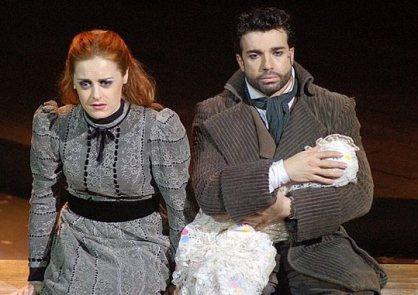
Noticeably uncomfortable with this forced arrangement, Herculano excuses himself by claiming he needs to get cigarettes — the same excuse he offered at the start that led to his leaving Amelia. Baby Clara is now in Amelia’s arms. Not knowing what else to do, she sings a soothing lullaby to keep the girl quiet:
Meu peito no seu
Meu colo, meu calor, meu sal
A lua que vai
Voltar enfim ao meu quintal
Meu pródigo amor!
My heart on your heart
My kindness, my passion, my all
The moon in the sky
Will rise again tonight, my heart
The one adore!
For the last time, the huge clock is lowered onto the stage in exactly the same manner as in the beginning. A train whistle is heard in the distance, coming closer and closer to the station. Resolutely speaking the words, “Está na minha hora” (“It’s my time to go”) Amelia takes the baby and suitcase and disappears behind the clock.
From the opposite side of the clock, Old Stepmother emerges with Clara. She sings the same lullaby that Amelia just sang to the baby. Clara lays her head on her stepmother’s lap. It’s obvious that the two most important women of the story, Amelia and Old Stepmother, are one and the same person, that the girl Clara is the product of the union between Bianca (i.e., Snow White) and Herculano, and that she was abandoned — as Amelia was — by her mother.
Taking up where she left off, Old Stepmother begins to tell the story of Snow White anew: “Once upon a time,” she commences. Tired of the routine, Clara interrupts Old Stepmother to ask why is it they have to go to the station every week. To which Old Stepmother responds: “I’m waiting for someone.” “But we’ve been coming here for years,” Clara complains, “but so far…” Old Stepmother cuts her off with a phrase she’s been muttering every day of her life: “There were seven tasks and I fulfilled them all… except for the seventh one… Now, what was that task again?” She looks at Clara for a moment and, absentmindedly waving the thought from her mind, declares simply, “I forget.”
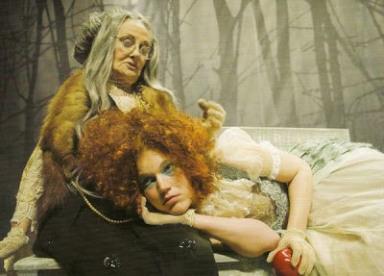
“That’s because you’ve grown old,” Clara concludes. She perks up and poses a rather curious question to the old woman: “Will I live happily ever after?” Looking forlornly at the girl, Old Stepmother shakes her head and replies, but not in a cruel way: “No, my darling.” She then resumes the Snow White story. But instead of Old Stepmother reciting it, we hear Amelia picking up the thread as she voices the oft-spoken line: “Magic mirror on the wall / who in the land is fairest of them all?”
At the same time, the music changes to a cello solo and the theme of “If this pathway,” as a young man with a suitcase comes striding in. It is Alvaro — Clara’s knight in shining armor — several years older yet none the wiser. What’s happened to Bianca? We may never know. He is wearing an overcoat to protect him from the elements (the elements of shock and surprise, no doubt) as he glimpses the couple seated together.
Old Stepmother recognizes the young man. “Alvaro!” she gasps in astonishment. Immediately, she rises from the bench and rearranges her hair in a provocative manner. Alvaro moves closer to the pair. Old Stepmother smiles expectantly, but he passes right by her, as if she were never there, a shadow of her former self. He sits on the bench in her place and looks deeply into Clara’s eyes. It’s love at first sight!
Amelia chooses that exact moment to come out from behind the clock. As she does, we hear the same pulse-pounding notes that began the musical, Amelia’s “He’ll Come Back” motif. He has come back, now, hasn’t he? But not in the way she had hoped.
The two women face each other for the first and only time — the young Amelia and her older embodiment — while Clara and Alvaro sit alone on the bench, gazing longingly at one another. Finally breaking the silence, Amelia and Old Stepmother speak the words that by all rights should bring the story to its conclusion: “Aqui começa o teu sortilégio!” (“Here begins your magic spell!)”
But the curse continues. The circle refuses to close… And the story never, ever ends…
BLACKOUT
Curtain
* * *
According to Spanish philosopher George Santayana, “Those who cannot remember the past are condemned to repeat it.” Not only is this the real cause of Amelia’s sorrow, but the central plight of all the characters in 7 – The Musical.
They have been duped by their own mad obsessions into forgetting the past. Recalling only their present predicaments, Amelia, Carmen, Bianca, Rosa, Clara, Herculano, and the rest are forced, one by one, to re-experience their transgressions: to wallow in self-pity over such peccadilloes as adultery, murder, prostitution, deceit, abandonment, infidelity, black magic and other debaucheries.
Relief from this vicious cycle is not to be had: their fate has been sealed, the portal remains closed — predetermined from the outset by Carmen’s powerful spell. They are all condemned to endlessly repeat their mistakes — complicit bystanders in a living hell of their own making, existentialism taken to the ultimate extreme. A revisionist No Exit perhaps? Absolutely!
Musical director Claudio Botelho once told me that “7” is very much like Sondheim’s Passion, in that it’s “a story about love and loss, about being left by the one you love, about losing your mind for someone else,” until you spend every waking hour in a fruitless search for that which you have lost. It’s a grown-up tale with a grown-up viewpoint — the very model of a modern major musical.
The Brazilian musical has reached its maturity. And, like the memorable characters of Bianca and Clara, it has come of age at last: long may it thrive.
If I were a gambling man, I’d be willing to bet the rent that in a game of chance “7” would come up the winner every time. ☼
(With gratitude and acknowledgement to Charles Möeller, Claudio Botelho, Ed Motta and Tania Carvalho)
English lyrics by Josmar F. Lopes – Copyright © 2014 All rights reserved.
Copyright © 2014 by Josmar F. Lopes

